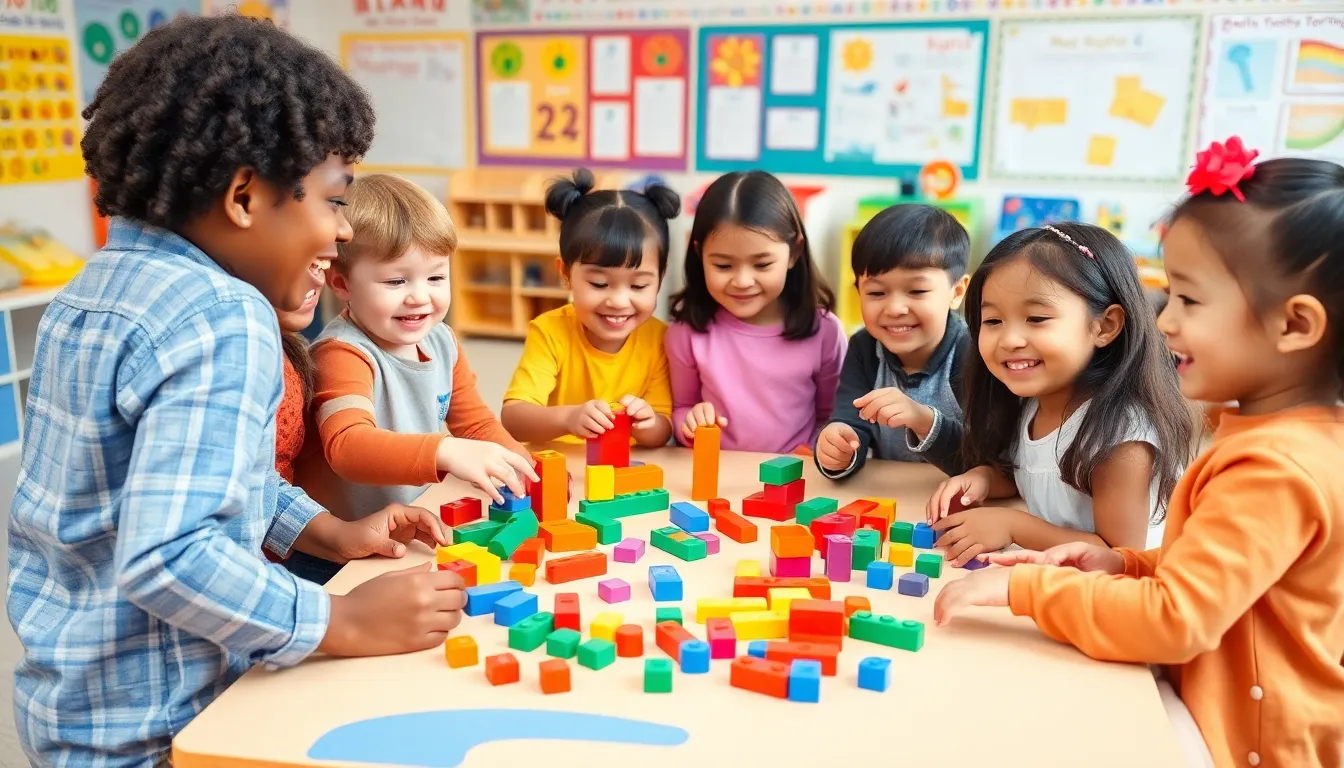When it comes to preschoolers, math isn’t just about numbers—it’s a magical world of shapes, colors, and counting that can spark their curiosity. Imagine a place where toddlers can explore math concepts while having a blast. Sounds like a dream, right? Well, it’s time to turn that dream into reality with engaging preschool math activities that make learning feel like playtime.
Table of Contents
ToggleOverview of Preschool Math Activities
Engaging preschool math activities introduce essential concepts while combining fun and learning. Activities like counting games, shape exploration, and color identification build a strong mathematical foundation. Young learners grasp numbers through everyday interactions such as snack time or playtime. Incorporating physical movement enhances comprehension, making math tangible.
Utilizing manipulatives like blocks, beads, or puzzles fosters hands-on learning. These tools promote problem-solving skills and encourage independent thinking. Storytime also provides opportunities to integrate math, with books that feature counting, shapes, or patterns.
Group activities enhance social skills while reinforcing math concepts. Engaging in partner games or collaborative projects allows kids to learn from each other and develop communication skills. Simple board games introduce strategic thinking and counting in a playful setting.
Technology integration offers various educational apps designed specifically for preschoolers. Virtual games and interactive lessons provide alternative learning methods, catering to different learning styles. Parents and educators can leverage this technology to create a balanced approach to math education.
Routine activities provide context for math learning. Whether sorting toys by size or color or measuring ingredients for a recipe, everyday tasks become math lessons. By embedding math into daily life, children experience its relevance and importance.
Incorporating arts and crafts can further enhance math understanding. Projects that involve measuring, counting, or patterning motivate creativity while reinforcing mathematical skills. Overall, preschool math activities encompass a variety of approaches, ensuring a well-rounded experience for young learners.
Importance of Early Math Skills

Early math skills form a crucial foundation for children’s overall development. Engaging preschoolers in mathematical concepts fosters readiness for future academic challenges.
Cognitive Development
Cognitive development thrives through early math experiences. Recognition of numbers, shapes, and patterns stimulates children’s brains. Engaging with counting and sorting activities enhances critical thinking abilities. Problem-solving skills emerge when they encounter challenges during games and hands-on activities. Spatial reasoning increases through exploring shapes and filling gaps with blocks. Effective preschool math activities support memory retention and enhance concentration levels. Lastly, curiosity ignited by fun math tasks inspires a lifelong love for learning.
Social Skills Enhancement
Social skills benefit significantly from collaborative math activities. Working together in groups encourages communication among peers. Sharing tools and ideas during activities like board games fosters teamwork. Children learn to negotiate and resolve conflicts when working toward common goals. Additionally, taking turns during games instills patience and respect for others. Emphasizing social interactions during math activities creates a supportive learning environment. Ultimately, these experiences strengthen relationships, enabling preschoolers to develop crucial social competencies.
Types of Preschool Math Activities
Preschool math activities come in various forms, engaging young learners through diverse methods. These methods include hands-on activities and digital tools, each promoting mathematical understanding in unique ways.
Hands-On Activities
Hands-on activities utilize tactile resources to enhance learning. Objects like blocks, counters, and puzzles encourage interactive exploration. Kids can sort shapes, count items, or build structures, reinforcing concepts through play. Learning centers filled with different manipulatives boost creativity while laying a strong foundation for future math skills. Counting songs and physical movement create a fun atmosphere, making math feel like playtime. Activities that involve measuring ingredients for simple recipes introduce practical applications of math, integrating learning with real-life experiences.
Digital Math Tools
Digital math tools provide interactive ways to learn through technology. Educational apps and games target specific math skills, catering to various learning styles. Kids engage with colorful visuals and fun challenges that foster competition and achievement. Programs often include activities that adapt to individual progress, allowing for tailored experiences. Online platforms may offer interactive storybooks that incorporate mathematical concepts, blending literacy with numeracy. Parents and educators can monitor progress through these tools, ensuring that learning objectives align with developmental needs.
Creating an Engaging Learning Environment
Creating a stimulating learning environment captivates preschoolers’ interest in math. Engaging surroundings encourage exploration and hands-on experiences for young learners.
Using Everyday Objects
Utilizing everyday objects enhances math learning by linking concepts to real-life scenarios. Items like buttons, straws, and natural materials serve as effective manipulatives for counting and sorting exercises. For instance, she can create a counting game using fruits, making it relatable and fun. Opportunities arise when he incorporates household items into activities, enriching the learning experience. Shape recognition comes alive with common objects, allowing children to identify shapes in their surroundings. Emphasizing this connection fosters a deeper understanding of mathematical principles through familiar contexts.
Incorporating Play
Incorporating play into math activities increases engagement among preschoolers. Games that involve counting, sorting, or measuring transform learning into an enjoyable experience. For example, they can play a shape scavenger hunt, where children search for specific shapes around the classroom. Fun board games provide an opportunity for strategic thinking while reinforcing math skills. Arts and crafts also introduce math concepts, as children measure and discuss dimensions while creating projects. Adopting playful methods nurtures a positive attitude toward learning, making math a delightful part of daily activities for preschoolers.
Tips for Educators and Parents
Engaging preschoolers in math requires thoughtful strategies from both educators and parents. They can cultivate a rich learning environment that encourages mathematical exploration and positive attitudes toward the subject.
Encouraging Exploration
Children thrive on discovery. Hands-on activities like counting objects and sorting shapes empower them to engage with math concepts in meaningful ways. Utilizing everyday materials such as toys or household items sparks curiosity and promotes experiential learning. Parents can introduce simple experiments, like measuring ingredients for cooking, to illustrate practical math applications. Group activities, such as scavenger hunts, foster collaboration while allowing little ones to explore spatial relationships and patterns in their surroundings. Interactive experiences like these lay the groundwork for a deeper understanding of mathematical concepts.
Fostering a Positive Attitude Towards Math
A supportive learning environment shapes how children perceive math. Instilling a sense of accomplishment starts with celebrating small successes, reinforcing their confidence. Presenting challenges as fun puzzles rather than daunting tasks shifts their perspective and encourages ongoing engagement. Incorporating games that involve counting or shape recognition builds essential skills while maintaining an element of play. Discussions about math in everyday life highlight its relevance, making the subject less intimidating. These strategies cultivate a positive attitude, supporting children’s willingness to explore and learn without fear of making mistakes.
Engaging preschoolers in math activities is vital for their cognitive and social development. By incorporating fun and interactive experiences, children not only learn essential math concepts but also develop a positive attitude toward learning.
Utilizing everyday objects and playful strategies makes math relevant and exciting. Whether through hands-on activities or digital tools, the key is to create an environment that fosters exploration and curiosity.
Celebrating achievements and presenting challenges as enjoyable puzzles encourages children to embrace math with confidence. With the right approach, preschool math can become a delightful journey that lays the groundwork for future academic success.



